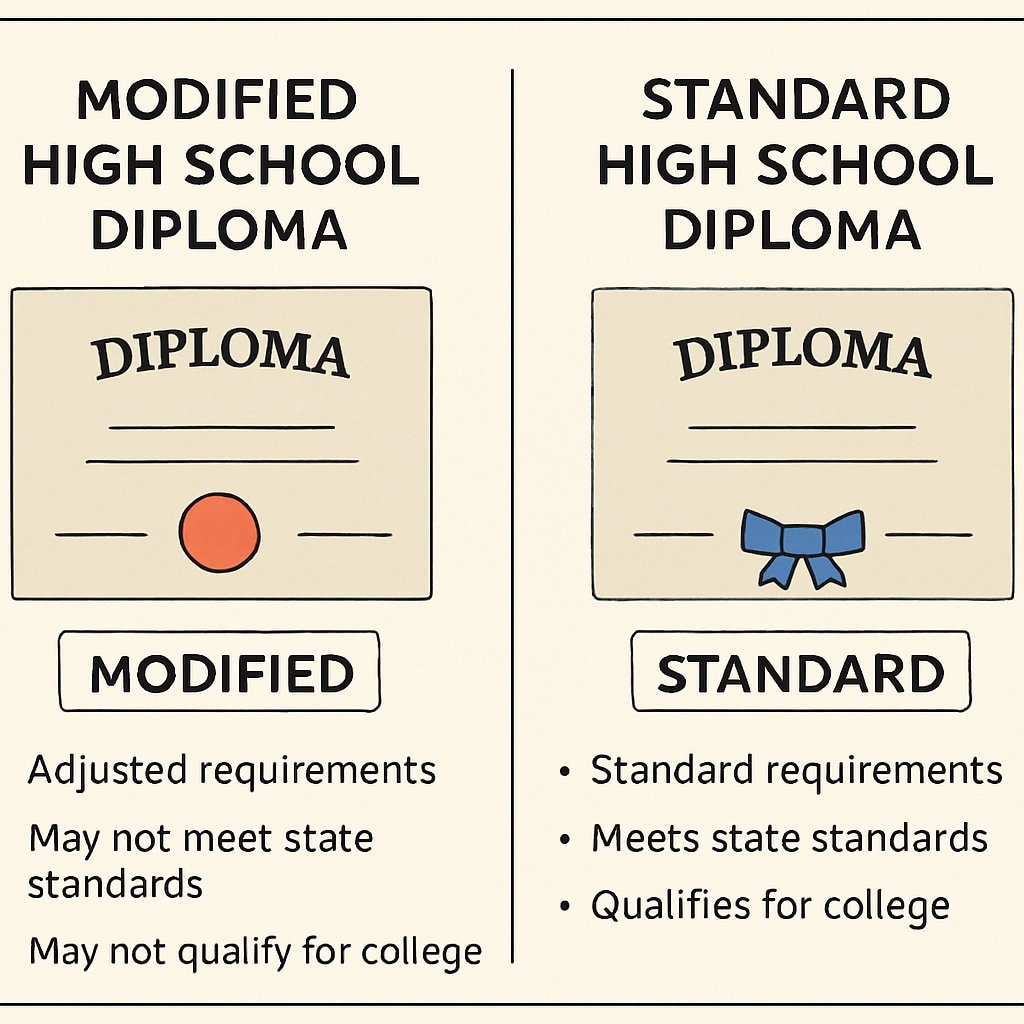The choice between a modified high school diploma and a standard diploma can significantly impact a student’s future. For some, this decision may lead to regret when the limitations of a modified diploma become apparent. Understanding the differences between these diploma types, why students may feel regret, and how to address these challenges can provide valuable guidance for families and students alike. This article will discuss these topics and offer actionable advice for those seeking to transition from a modified diploma to a standard one.
Understanding the Distinctions Between Modified and Standard Diplomas
High school diplomas serve as certifications of academic achievement, but not all diplomas carry the same weight. A standard high school diploma typically reflects the completion of a rigorous curriculum that meets state or national education standards. It is widely recognized by employers, colleges, and trade schools as evidence of a student’s ability to meet academic challenges.
In contrast, a modified diploma is often tailored to accommodate students with special needs or those who face significant academic challenges. These diplomas may involve adjusted coursework, reduced credit requirements, or alternative assessments. While modified diplomas provide an essential pathway for students with unique needs, they may not always meet the entry requirements for higher education institutions or certain employment opportunities.

Why Students May Regret Choosing a Modified Diploma
Regret often arises when students realize the limitations associated with a modified diploma. For example, many colleges and universities require a standard diploma or its equivalent for admission. Similarly, some employers may view a modified diploma as insufficient evidence of job readiness, particularly for roles requiring advanced skills or certifications.
Additionally, societal perceptions of modified diplomas can contribute to feelings of inadequacy. Students may feel they missed out on traditional educational experiences or opportunities available to their peers. This regret is often compounded by a lack of awareness about the long-term implications of choosing a modified diploma during their high school years.
Can a Modified Diploma Be Converted to a Standard Diploma?
The possibility of transitioning from a modified diploma to a standard one depends on the educational policies of the school district or state. In some cases, students may be allowed to complete additional coursework or pass standardized tests to meet the requirements for a standard diploma. However, this process can be challenging and time-consuming, requiring careful planning and support from educators and family members.
For example:
- Some states offer adult education programs that allow individuals to earn a standard diploma after high school.
- Online high school programs may provide flexible options for completing the necessary credits.
- Community colleges often offer bridge programs to help students meet the prerequisites for higher education.

Practical Steps for Students and Families
If a student regrets earning a modified diploma, there are actionable steps they can take to address their concerns:
- Evaluate Eligibility: Consult with school counselors or state education departments to determine whether the student qualifies for diploma conversion programs.
- Assess Academic Gaps: Identify the specific coursework or tests needed to meet the standard diploma criteria.
- Explore Alternative Pathways: Consider enrolling in adult education or online programs to complete the necessary requirements.
- Seek Guidance: Work closely with educators, mentors, and family members to create a personalized plan for achieving academic and career goals.
Looking Ahead: The Importance of Informed Decision-Making
Choosing the right type of high school diploma is a critical decision that can shape a student’s future. To avoid regret, families and students should thoroughly research their options and consider long-term goals. Open communication with school counselors and educators is essential for understanding the implications of diploma choices and ensuring that the selected pathway aligns with the student’s aspirations.
For those who have already earned a modified diploma, it’s important to remember that opportunities for growth and advancement remain available. With determination, planning, and support, transitioning to a standard diploma—or pursuing equivalent certifications—can open new doors to education and employment.
Readability guidance: This article uses clear, concise language and short paragraphs to enhance readability. Lists and headings are included to organize information effectively, while transitional phrases like “in contrast” and “for example” provide smooth connections between ideas.


